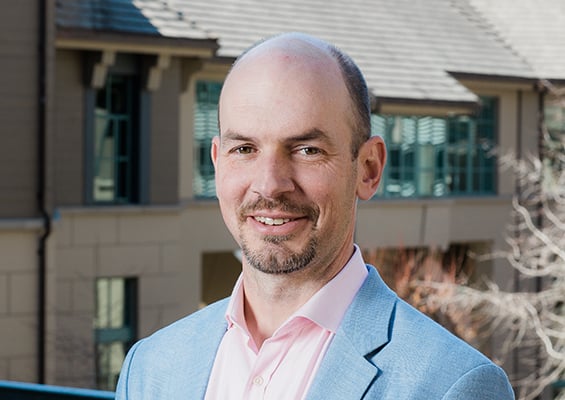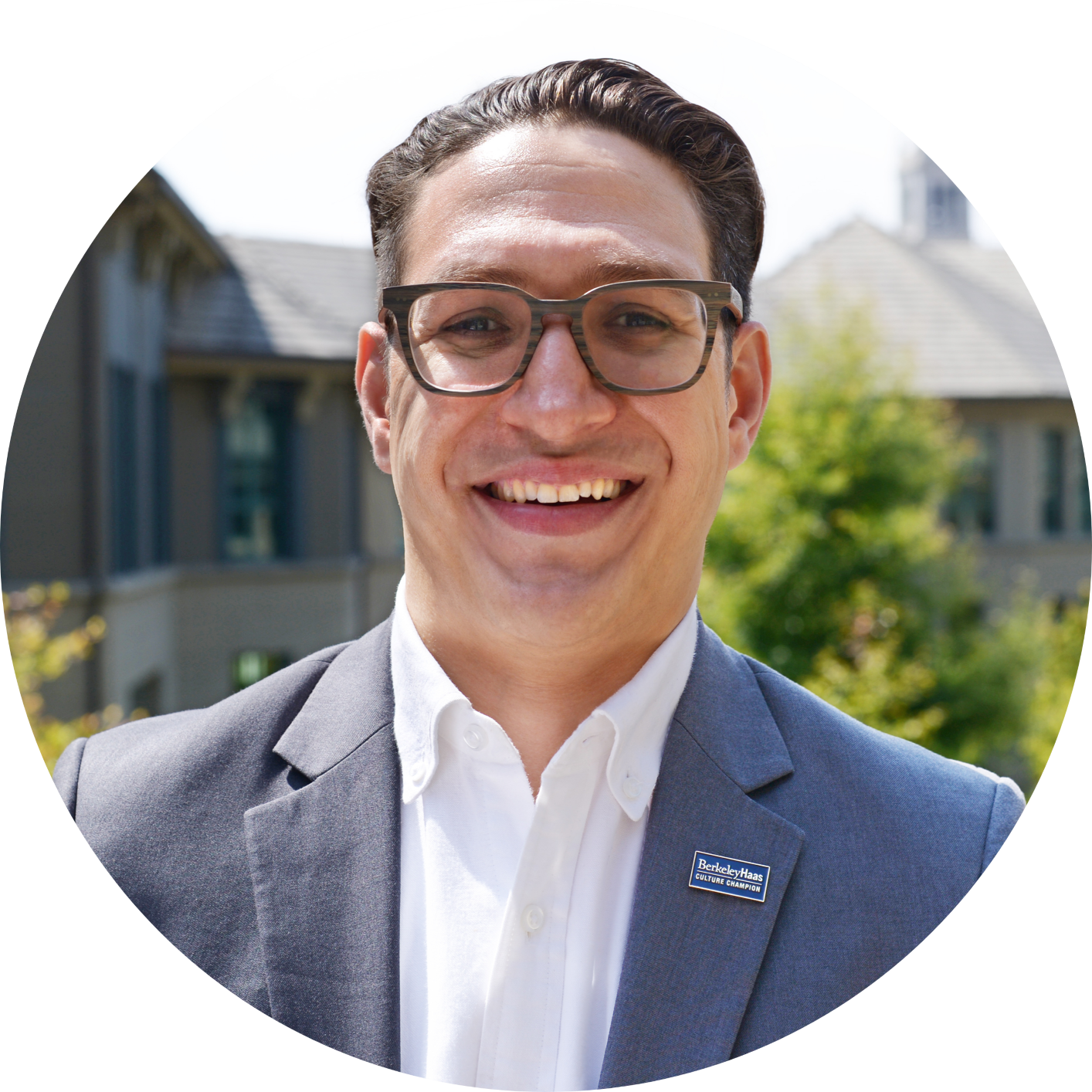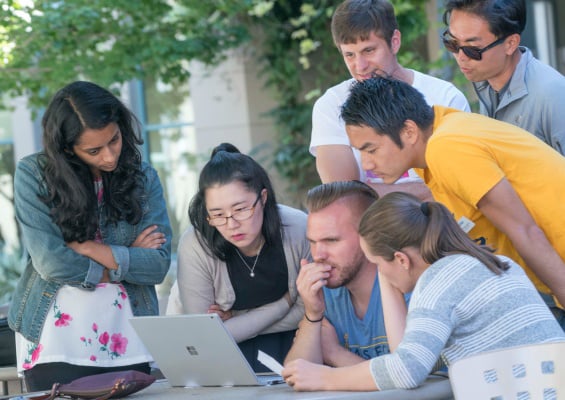Jon Metzler brings insights and experience to his classes in strategy and competitive advantage in technology markets. And a fierce loyalty to UC Berkeley, where he earned a joint MBA and Masters in Asian Studies. Prior to coming to Haas as a student, he had worked for several years in Japan. Throughout his career, he has been involved in business launches ranging from print to online media to wireless infrastructure, and from edtech to events and services. In addition to teaching, Metzler is president and founder of Blue Field Strategies, a consulting firm helping infrastructure companies harness and accelerate innovation.
Your class, Strategy for the Networked Economy, is cross-listed as an elective for both full-time and evening students. What are your observations about teaching students for the two programs in a single class?
I really appreciate having both groups of students in class. They bring a host of different perspectives, and that gives them all the opportunity to learn from each other.
Typically, the class is pretty evenly balanced between evening/weekend and full-time students. Each group brings its own backgrounds and perspectives. The full-time students tend to be more geographically and occupationally diverse and are often in a more reflective space, particularly if they are looking to transition careers. The evening students, because they are in the thick of it on the job, bring a lot of insights and questions that are pertinent to their current jobs. There can be an urgency to the questions asked by the evening students, who want to use the answers on the job next week, or perspectives they can share in an interview! Of course, the same could be said of the questions full-time students ask when they are in the midst of interviewing for jobs and internships.
We really do get a mix of poets and quants, and each brings something different to the classroom."
Your new elective has an intriguing name: Clusters: Locations, Ecosystems & Opportunity. What is it about?
I have long been interested in the geography of jobs and the intersection of place and work. My MBA/MA thesis related to the concept of regional advantage, and that’s been a consistent thread in my career, whether it involved cross-border (usually transpacific) business or even within the US, such as connecting Silicon Valley and Washington DC.
Covid-19 added a layer of new work opportunities. I wondered if remote work from home, wherever home might be, would be a meaningful, long-term opportunity for mid-tier cities. Even attracting just a few innovators, or even one growth company, can make a big difference for a regional economy. A famous example is Microsoft, while it was still a startup, moving to Seattle from New Mexico, which helped create an environment that later attracted Amazon.
It is a small class, which allows us to go deep in our discussions. There is an almost even mix of US and international students, and we incorporate their interests, reflections, and backgrounds in our discussions. We look at both US domestic examples, like Pittsburgh, Napa, and Raleigh-Durham, and international cities, such as Dubai and Shenzhen. The final assignment is writing an augmentation plan to help a mid-tier city improve its competitive footing relative to more established clusters like Silicon Valley, Boston, or New York.
You have taught the core Strategy class. What are the differences in teaching an elective or a core class?
Everyone is here by choice. Even me. I made a mid-career choice to teach. I felt I had something to give to the next generation of business leaders. I also feel strongly about giving back, in particular giving back to Berkeley Haas where I got my MBA/MA-Asian Studies.
In first coming back to teach, I had proposed teaching on strategy in telecom and media, and on business in Japan, and was able to find opportunities to teach on both topics. So, I started with electives. The students are very motivated and bring an intensity and passion to the subject matter.
Teaching the core was intense in a different way. First, teaching two sections of the core means meeting half of the class! That’s fantastic. It’s clear the FTMBA 2022 class will do great things. It also presented a bit of an active memory challenge. Most of all, though, I loved the diversity. We really do get a mix of poets and quants, and each brings something different to the classroom.
Teaching the core also helped renew my appreciation of the intensity of the core experience, something I had experienced as an MBA many moons ago.
Tell us about your involvement with the Berkeley SkyDeck business accelerator.
These days, I serve as a kind of funnel. I solve a navigation problem, connecting start-ups and students with mentors, as well as connecting firms with entrepreneurs at SkyDeck, or sending them toward another department or program.
SkyDeck is a tremendous advantage. It offers tremendous support and resources to people who know they want to be entrepreneurs. More broadly, it is a magnet for people and firms who are curious about the entrepreneurial ecosystem at Berkeley. Unlike some other accelerators, it is multidisciplinary, and represents the diversity of activity at Berkeley, whether business, engineering, chemistry, etc.
What advice would you give a prospective student?
Come visit! When I was applying for my MBA, I visited Berkeley and another campus. It wasn’t just the warm sun cascading over the hills and the bridge view that attracted me, though, of course that helped, especially coming from the Midwest. It was warm welcome I got from students and staff that convinced me to come.
When visitors come to my classes, I introduce them, and try to involve them in the discussion as appropriate. The students do the same; they are our best and most authentic ambassadors.
The expertise and insight your professors bring helps deepen and enhance your MBA journey. By selecting a top school with top-notch professors, you maximize your experience.
Read more from the Take 5 with a professor series:
- Homa Bahrami explores agility and flexibility for enterprises and individuals
- Cameron Anderson can prove that being a jerk is not a good career strategy
- Laura Kray reveals the skill MBAs want in their core curriculum
- Kellie McElhaney talks equity fluency, courage, and vulnerability
- Lucas Davis shares hardest economic concept for MBA students to grasp
- Jenny Chatman gives three benchmarks of an effective organizational culture
- Jennifer Cohen talks equitable and inclusive leadership
- Clark Kellogg shares how he teaches design thinking, creativity, and innovation
- Dave Rochlin talks flipping the classroom: MBAs learn by doing
- Maura O'Neill says narrow-mindedness is the enemy of innovation
- Bill Pearce says most important trait of a successful marketer is empathy









